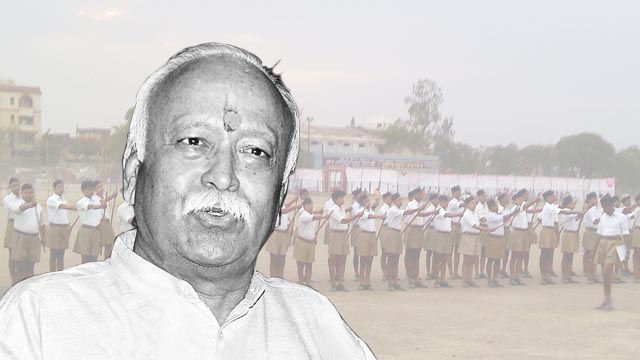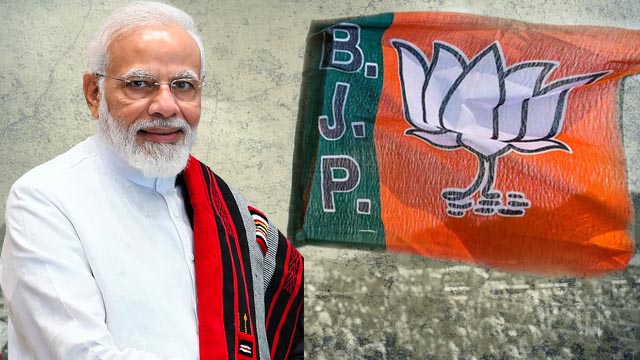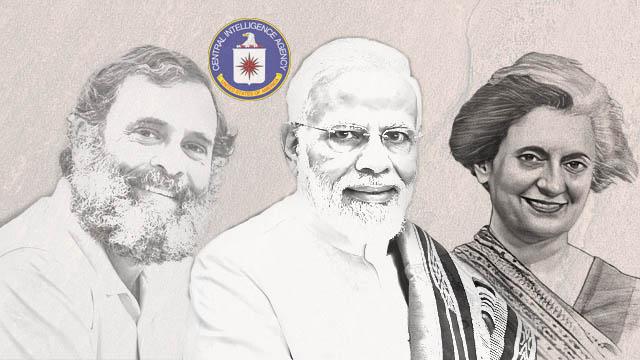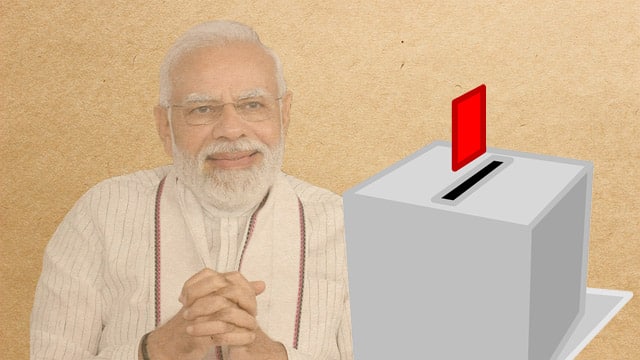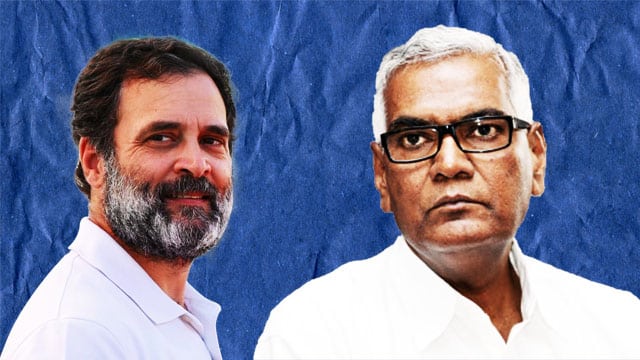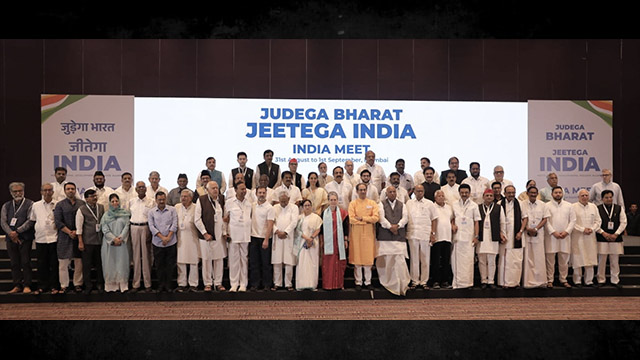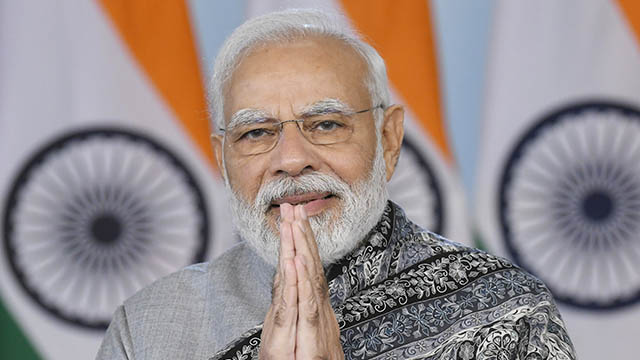Rashtriya Swayamsevak Sangh’s (RSS) chief Mohan Bhagwat’s certain remarks on Hindus and Muslims during his recent interview with the organisation’s mouthpiece Organiser has stirred a new controversy. Bhagwat’s remarks evoked a strong response from opposition parties like the Communist Party of India (CPI), the Communist Party of India (Marxist) [CPI(M)] and All India Majlis-E-Ittehadul Muslimeen (AIMIM).
During his interview, Bhagwat said that the Hindus have been at war for 1,000 years, which is responsible for the new-found aggression in the community. He also said that the Muslims are safe in India and can “stay” in the country if they shed their alleged “supremacist” attitude.
AIMIM chief and Member of the Parliament Asaduddin Owaisi criticised Bhagwat’s remarks saying, “Who is Mohan Bhagwat to give Muslims permission to live in India or follow our faith? We’re Indians because Allah willed it. How dare he put ‘conditions’ on our citizenship? We’re not here to ‘adjust’ our faith or please a bunch of alleged celibates in Nagpur.”
The CPI(M) Politburo said, “He (Bhagwat) has threatened the Muslim minority community that they will have to give up ideas of ‘supremacy’ to remain safe. He justifies the aggression of ‘Hindu society’ in the name of perceived historical wrongs, stating that Hindus are ‘at war’. He has virtually given a call for violence against a section of Indian citizens on the basis of religious affiliation”.
India’s main opposition party, the Indian National Congress (INC), has not officially reacted to Bhagwat’s remarks on Hindus and Muslims. The CPI general secretary, D Raja, criticised Bhagwat’s remarks saying, “Such provocations must be resisted and defeated through unity”.
Although the RSS, the ideological parent of Prime Minister Narendra Modi’s ruling Bharatiya Janata Party (BJP), is known as the world’s largest ultra-nationalist Hindu paramilitary force and has been accused of complicity in communal violence in the Indian subcontinent since 1925, Bhagwat’s remarks, if seen in the context of his interview to the Organiser, doesn’t imply what the opposition parties have alleged.
“Hindus at war”
Bhagwat’s remarks on “Hindus at war” didn’t explicitly portray the minority Muslims as enemies. However, using historical context, Bhagwat implied that the Hindus started their “war” against foreign invasion when Muslim rulers invaded the Indian subcontinent.
Bhagwat said, “This war is not against an enemy without, but against an enemy within. So there is a war to defend Hindu society, Hindu Dharma and Hindu culture. Foreign invaders are no longer there, but foreign influence and foreign conspiracies are continued. Since this is a war, people are likely to get overzealous. Although this is not desirable, yet provocative statements will be uttered.”
Saying this, Bhagwat, on the one hand, defended the communal Hindu-Muslim dichotomy used by the RSS-led conglomerate called Sangh Parivar to allegedly polarise the voters in favour of the BJP, while on the other, he distanced the RSS from any act committed by “overzealous” elements, calling such acts non-desirable and statements, “provocative”.
It has been alleged by several Indian opposition parties, intelligentsia and the press that there has been a rise in ultra-right Hindu jingoism ever since Mr Modi became the prime minister in 2014, winning a landslide victory against the INC using his charisma as a Hindu nationalist.
The RSS has been distancing itself from the growing incidents of violence against minorities, hate-speeches by people affiliated with its subsidiaries, although it didn’t condemn such acts in public.
Moreover, while talking about Hindus being at war, Bhagwat also criticised the caste system, which is responsible for the growing incidents of caste violence, targeting Hindus at the bottom of the caste hierarchy and the ostracised Dalit community.
“Shri Ram strung together all jati and sects. But even today, people in our country are getting whipped for so much as mounting another’s wagon. Should this not change? Everyone, who has carried forward that tradition of awakening, has talked about this. Hindu society has hailed the sloganeering but not this message of self-purification. Hindu society hasn’t fully awakened to this reality; it should happen. We keep talking about war, war, war (against someone) but what about us? If war is there, what is our status,” Bhagwat asked.
Bhagwat emphasised the RSS’s agenda of bringing Hindus of all castes under its banner by referring to the issue of caste violence and talking about self-purification. Also, by referring to “self-purification”, he emphasised that the “war” he is talking about should be more about rectifying the problems within the Hindu society. This ambiguous statement keeps the doors ajar for much political manoeuvre in the future.
Criticising the viewpoint of several Hindutva rabble-rousers, who have been at the forefront of anti-Muslim hate speeches across the country and claim that there is an ongoing war between the Hindus and Muslims, represented as ‘two nations’ following the Hindutva ideologue Vinayak Savarkar’s assertion, the RSS chief said, “Staying perpetually into fighting mode will do us no good. In national life, it does not happen this way. To think that those who fight can accomplish everything is also a mistake.”
Bhagwat’s remarks on Muslims
While Owaisi, the CPI and the CPI(M) have criticised Bhagwat’s remarks on Muslims living in India, the RSS chief spoke carefully on the issue while laying down conditions for Muslims to stay in India. He neither tagged them as “outsiders” nor threatened them, rather balanced his warning by also naming Hindus and, surprisingly, communists.
Even when Bhagwat claimed India is a “Hindu Rashtra” (Hindu state), which contradicts the Indian constitution’s definition of the state as a “secular” one, he assured safety to Muslims.
“Hindusthan should remain Hindusthan. There is no harm to the Muslims living today in Bharat. If they wish to stick to their faith, they can. If they wish to return to their ancestors, they may. It is entirely their choice. There is no such stubbornness in Hindus. Islam has nothing to fear. But at the same time, Muslims must abandon the boisterous rhetoric of supremacy”, Bhagwat said.
He defined Islamic “rhetoric of supremacy” as Muslims allegedly believing, “We are of an exalted race; we once ruled over this land, and shall rule it again; only our path is right, rest everyone is wrong; we are different, therefore we’ll continue to be so; we cannot live together.” Bhagwat said, “…they (Muslims) must abandon this narrative.”
However, the crux is that Bhagwat’s remarks weren’t confined to the Muslims alone. To balance the RSS’s narrative, he even asked the Hindus and communists to shed their alleged supremacist outlook. “In fact, all those who live here—whether a Hindu or a communist—must give up this logic,” Bhagwat said.
What’s behind the RSS’s balanced tone?
The RSS has indeed been accused of spreading communal hatred, polarisation and inciting violence since its inception by its opponents; Bhagwat’s attempt to balance the narrative by carefully criticising the idea of Hindus being at war and endorsing the Muslims’ right to live in India and practice their religion are parts of an image makeover the RSS has undertaken under his leadership.
One of the factors that can be credited for this slight change in the RSS’s approach is its endeavour to become a global voice for the growing Indian Hindu diaspora in the western world, where the ultra-right organisation has faced condemnations earlier for its alleged role in fermenting anti-minority sentiments in India.
It’s noteworthy that the US secret service organisation Central Intelligence Agency (CIA) had designated two of the RSS’s affiliated outfits — Bajrang Dal and Vishwa Hindu Parishad (VHP) — as militant organisations. The Indian foreign ministry had to do damage control when there were global outbursts against growing Islamophobia in India.
Earlier, RSS-affiliated organisations and Hindutva apparatchiks had accused Indian Muslims of spreading Covid-19 in the country. In 2022, the BJP had to fire one of its spokespersons and a top leader when they made derogatory comments against Prophet Muhammad.
Bhagwat’s remarks on Hindus and Muslims show that the RSS is trying to do an image makeover to gain more global acceptability and to shed its image as an ultra-nationalist Hindu paramilitary force that acts as the ideological fountainhead of rabid Hindutva hatemongering, allegedly patronised by Mr Modi’s government.
Although the opposition’s sharp criticism against Bhagwat’s remarks is based on isolated passages from the interview, without considering the context, it’s yet to be seen whether the RSS would walk the talk or Bhagwat’s remarks will go down the annals of history as another instance of phrase-mongering, which Indian politicians are infamous for.
Tanmoy Ibrahim is a journalist who writes extensively on geopolitics and political economy. During his two-decade-long career, he has written extensively on the economic aspects behind the rise of the ultra-right forces and communalism in India. A life-long student of the dynamic praxis of geopolitics, he emphasises the need for a multipolar world with multilateral ties for a peaceful future for all.

